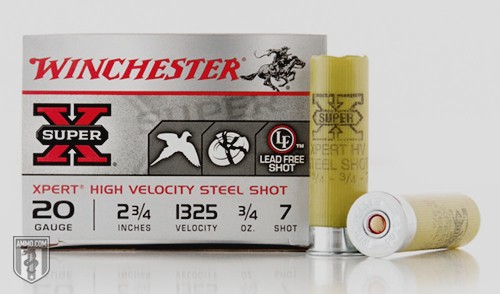#7 Steel Shot Ammo: #7 Steel Shot Explained
 #7 shot is primarily used for target shooting, clays and medium-sized birds like grouse, partridge, quail, and snipe. Old-timers will usually refer to #7 and #7.5 as “dove shot,” because it excels at hitting birds and small animals that are roughly the size of a large dove. As with any steel shot, you will sacrifice a bit of power and penetration compared to the lead equivalent, but you will gain the ability to hunt in all the places where lead is banned. Steel shot is also one of the lower-priced, “non-toxic” types of ammo. So if you love hunting, clay shooting and target shooting – this ammo should meet all your needs. Today, #7 shot is most commonly found in 12 and 20 gauges, from manufacturers like RIO, Fiocchi and Winchester.
#7 shot is primarily used for target shooting, clays and medium-sized birds like grouse, partridge, quail, and snipe. Old-timers will usually refer to #7 and #7.5 as “dove shot,” because it excels at hitting birds and small animals that are roughly the size of a large dove. As with any steel shot, you will sacrifice a bit of power and penetration compared to the lead equivalent, but you will gain the ability to hunt in all the places where lead is banned. Steel shot is also one of the lower-priced, “non-toxic” types of ammo. So if you love hunting, clay shooting and target shooting – this ammo should meet all your needs. Today, #7 shot is most commonly found in 12 and 20 gauges, from manufacturers like RIO, Fiocchi and Winchester.
Hunting Use
#7 is one of the most popular sizes available for mid- to small-sized birds like phesant and dove, because you have great range without a huge amount of damage to the meat. There is nothing worse than making a good shot on a bird, only to realize all that is left is the beak and feathers. Grouse, partridge and quail are good targets for this shot as well, but since you’re using steel shot, you’ll want to try to remain in the 25- to 35-yard range whenever possible. These birds are more well-padded than you might think.
Many environmentalists have questioned the safety of using lead shot, so some areas and states have banned its use – mandating shooters to use steel loads. Although it remains a sore topic for many, the fact remains that virtually all public hunting lands do not allow the use of lead shot. However, it must be noted that some hunting situations require extra precautions when hunting with steel due to ricochets.
Clays, Traps and Targets
#7 steel shot is great for clays and trap shooting, whether mechanical or hand-thrown, and it’s a nice round to use on paper targets. But, as in hunting, the target shooter must be aware of the potential for ricochets due to the increased hardness of the steel pellets. It must also be noted that steel shot is not appropriate for any sport shooting that uses metal targets. This means that three gun and other shooting competitions that require the competitor engage metal targets will most likely not allow the use of steel.
If you’re used to using #7 lead shot, be aware that the steel shot will perform a little different. The range, spread and effective penetration distance can change depending on your shotgun – so take your time and fire some rounds at the range or on your property to figure out how this ammunition will perform with your preferred shotgun. Different choke types can change performance drastically as well, significantly changing the size of your spread, range, and other factors. Changing shell lengths can also make quite a difference. Get to know a few of them and find the one you like best.
Shotgun Projectiles
- #12 Lead Shot Ammo
- #9 Lead Shot Ammo
- #8.5 Lead Shot Ammo
- #8 Lead Shot Ammo
- #7.5 Lead Shot Ammo
- #7 Steel Shot Ammo
- #6 Lead Shot Ammo
- #6 Steel Shot Ammo
- #5 Lead Shot Ammo
- #5 Nickel-Plated Lead Shot Ammo
- #4 Lead Shot Ammo
- #3 Steel Shot Ammo
- #2 Steel Shot Ammo
- #4 Buck Ammo
- #3 Buck Ammo
- #1 Buck Ammo
- #1 Buck Rubber
- #0 Buck Ammo
- #00 Buck Ammo
- #000 Buck Ammo
- .4 Buck Ammo
- Rifled Slugs
- Sabot Slugs
